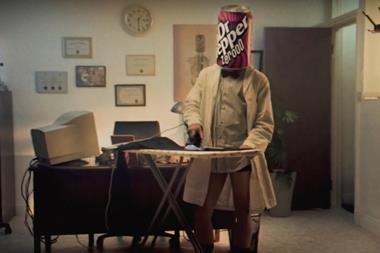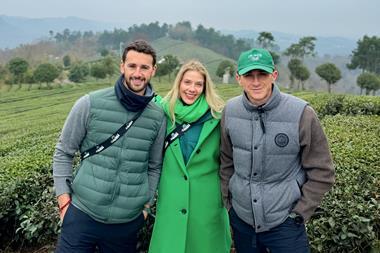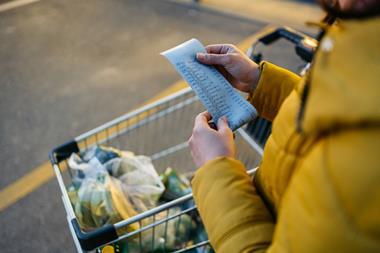Consumers are increasingly seeking low or no caffeine versions of tea and coffee. But is a major hot beverage sub-sector really in the throes of being created? The jury is out for now
When Nestlé launched Half Caff versions of its Nescafé Gold Blend and Original instant coffees at the tail of 2004, it backed them with a £6m marketing campaign to capture the post-Christmas healthy eating mood.
Head of consumer insights and planning Gavin Emsden says that while coffee is not actually viewed as unhealthy by most consumers, it’s not seen as healthy, either.
Many are now cutting down, if not cutting out, their caffeine intake.
Nestlé is trying to build on what it calls the reduced caffeine sector to attract shoppers who “may not want to go the whole hog and have no coffee at all”.
“People are looking for more balanced lifestyles,” Emsden says, “and Half Caff gives them more choice.”
The new line has “delivered against expectations”, taking a claimed 0.8% of the total instant coffee market by value. “We see this as a growth area, and it’s important to keep driving it,” says Emsden.
While growth in instant decaf coffee has actually been flattening - sales rose just 0.5% in value in the 52 weeks to June 19 [TNS] - both roast
and ground coffee producers and tea brands are extending their decaf offerings.
But opinions vary on whether consumers are really turning against caffeine in significant numbers.
“Decaf is a niche market that will only grow if future medical evidence shows adverse effects of caffeine intake,” says Chris Tarling, general manager of the Boaters roast and ground brand. But at Kraft, which starts an “intensive press and radio campaign” behind Kenco decaf this month, channel and communications manager Sarah Petts says that consumers are increasingly looking for reduced-caffeine alternatives to standard lines.
Kenco decaffeinated freeze-dried is the number one decaf instant coffee, with sales in excess of £18m, up 2.5% on last year [ACNielsen, MAT June 2005].
In tea, both the majors and the specialist or ‘ethical’ brands have now introduced decaf options. Unilever’s PG Tips came to the sector last year and has just kicked off a four-month, £750,000 dedicated marketing programme. Operations manager David Irwin says decaf tea is showing “strong underlying value growth” although he also warns value is being stripped out of the category by price-cutting.
Tetley launched a “new and improved” decaf tea in March, saying taste is the key issue for 75% of consumers, and that, according to its research, more consumers would drink decaf tea if they felt the taste measured up.
At Premier Foods, general manager Sarah Robinson voices a similar line. Premier’s Typhoo was first on the market with a decaf tea 15 years ago and is now brand leader with a 34% value share.
“Decaf is about 5% of the tea market but it’s twice that in coffee, so I could see decaf tea doubling in the next four years,” says Robinson.
“In fact, I think tea has the potential to be much greater, because most people buy coffee for the benefit the caffeine gives.”
When Nestlé launched Half Caff versions of its Nescafé Gold Blend and Original instant coffees at the tail of 2004, it backed them with a £6m marketing campaign to capture the post-Christmas healthy eating mood.
Head of consumer insights and planning Gavin Emsden says that while coffee is not actually viewed as unhealthy by most consumers, it’s not seen as healthy, either.
Many are now cutting down, if not cutting out, their caffeine intake.
Nestlé is trying to build on what it calls the reduced caffeine sector to attract shoppers who “may not want to go the whole hog and have no coffee at all”.
“People are looking for more balanced lifestyles,” Emsden says, “and Half Caff gives them more choice.”
The new line has “delivered against expectations”, taking a claimed 0.8% of the total instant coffee market by value. “We see this as a growth area, and it’s important to keep driving it,” says Emsden.
While growth in instant decaf coffee has actually been flattening - sales rose just 0.5% in value in the 52 weeks to June 19 [TNS] - both roast
and ground coffee producers and tea brands are extending their decaf offerings.
But opinions vary on whether consumers are really turning against caffeine in significant numbers.
“Decaf is a niche market that will only grow if future medical evidence shows adverse effects of caffeine intake,” says Chris Tarling, general manager of the Boaters roast and ground brand. But at Kraft, which starts an “intensive press and radio campaign” behind Kenco decaf this month, channel and communications manager Sarah Petts says that consumers are increasingly looking for reduced-caffeine alternatives to standard lines.
Kenco decaffeinated freeze-dried is the number one decaf instant coffee, with sales in excess of £18m, up 2.5% on last year [ACNielsen, MAT June 2005].
In tea, both the majors and the specialist or ‘ethical’ brands have now introduced decaf options. Unilever’s PG Tips came to the sector last year and has just kicked off a four-month, £750,000 dedicated marketing programme. Operations manager David Irwin says decaf tea is showing “strong underlying value growth” although he also warns value is being stripped out of the category by price-cutting.
Tetley launched a “new and improved” decaf tea in March, saying taste is the key issue for 75% of consumers, and that, according to its research, more consumers would drink decaf tea if they felt the taste measured up.
At Premier Foods, general manager Sarah Robinson voices a similar line. Premier’s Typhoo was first on the market with a decaf tea 15 years ago and is now brand leader with a 34% value share.
“Decaf is about 5% of the tea market but it’s twice that in coffee, so I could see decaf tea doubling in the next four years,” says Robinson.
“In fact, I think tea has the potential to be much greater, because most people buy coffee for the benefit the caffeine gives.”



















No comments yet